The BRICS Aerial Work Platforms Market is estimated to be valued at USD 14.1 billion in 2025 and is projected to reach USD 25.3 billion by 2035, registering a compound annual growth rate (CAGR) of 6.0% over the forecast period.
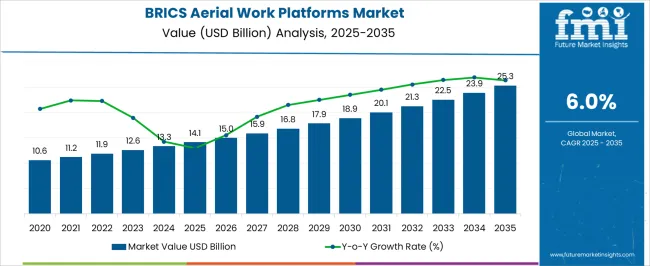
| Metric | Value |
|---|---|
| BRICS Aerial Work Platforms Market Estimated Value in (2025 E) | USD 14.1 billion |
| BRICS Aerial Work Platforms Market Forecast Value in (2035 F) | USD 25.3 billion |
| Forecast CAGR (2025 to 2035) | 6.0% |
The BRICS aerial work platforms market is witnessing steady expansion, supported by rapid infrastructure development, industrial growth, and increasing emphasis on workplace safety standards across Brazil, Russia, India, China, and South Africa. Demand for efficient and safe elevated access solutions is rising due to the growing construction, energy, manufacturing, and logistics sectors in these economies. Government initiatives to modernize infrastructure and ongoing urbanization are driving the adoption of aerial work platforms as safer alternatives to traditional scaffolding methods.
Technological advancements, including electric drive systems and telematics integration, are enhancing efficiency, reducing emissions, and improving operator safety, which is further accelerating adoption. Companies are also investing in fleet modernization and renting solutions to cater to dynamic demand across multiple sectors.
With safety regulations becoming stricter and industries seeking productivity improvements, aerial work platforms are expected to remain a vital component of operations in both industrial and commercial applications The BRICS region is positioned as a high-growth market, offering strong potential for manufacturers and rental companies to expand their presence and capitalize on increasing demand.
The brics aerial work platforms market is segmented by product type, platform height, engine type, end use, and geographic regions. By product type, brics aerial work platforms market is divided into Boom Lifts, Scissor Lifts, Vertical Mast Lifts, Portable Personal Lifts, and Others. In terms of platform height, brics aerial work platforms market is classified into 10 to 20 Metres, Below 10 Metres, 20 to 25 Metres, and Above 25 Metres.
Based on engine type, brics aerial work platforms market is segmented into Electric and Engine Powered. By end use, brics aerial work platforms market is segmented into Construction, Mining, Transportation and Logistics, Manufacturing, and Others. Regionally, the brics aerial work platforms industry is classified into North America, Latin America, Western Europe, Eastern Europe, Balkan & Baltic Countries, Russia & Belarus, Central Asia, East Asia, South Asia & Pacific, and the Middle East & Africa.
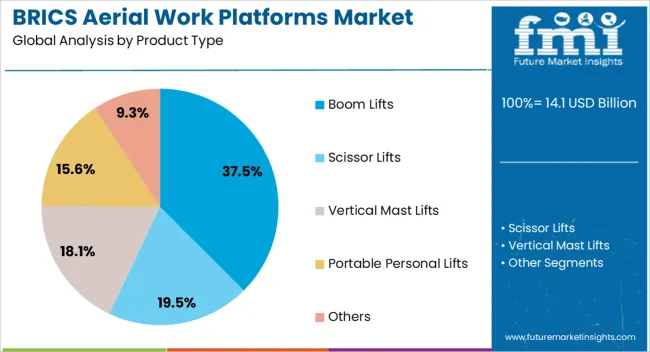
The boom lifts segment is projected to hold 37.5% of the BRICS aerial work platforms market revenue share in 2025, making it the leading product type. This leadership is being driven by the superior versatility and reach provided by boom lifts, which allow operators to access difficult and elevated work areas with efficiency and safety. The ability to extend both vertically and horizontally makes boom lifts highly suitable for applications in construction, maintenance, shipbuilding, and energy projects.
Their adaptability to complex working environments, combined with enhanced maneuverability, is reinforcing demand. Increased focus on safety compliance is encouraging companies to invest in equipment that ensures secure elevated access, further supporting growth. Additionally, technological innovations such as hybrid and electric-powered boom lifts are reducing operating costs and emissions, aligning with sustainability goals in the BRICS region.
The growing preference for renting boom lifts is also boosting accessibility, making them a cost-effective solution for contractors and enterprises These factors collectively are ensuring the dominance of the boom lift segment in the regional market.
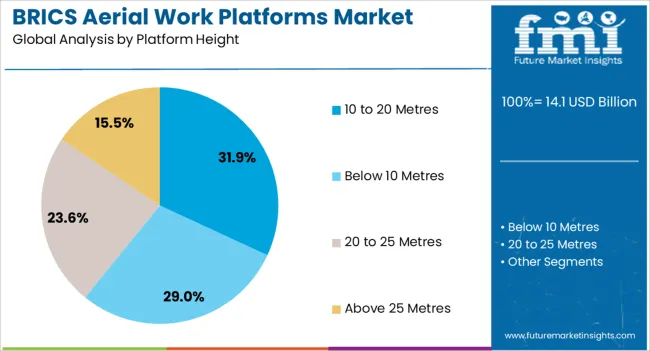
The 10 to 20 metres platform height segment is expected to account for 31.9% of the BRICS aerial work platforms market revenue share in 2025, establishing it as the leading height category. This dominance is being reinforced by the balance it provides between reach, maneuverability, and operational efficiency, making it suitable for both indoor and outdoor applications. The segment is benefiting from strong demand in construction, facility maintenance, and logistics operations where mid-range height access is essential.
Equipment within this range offers enhanced stability and safety while remaining compact enough to operate in constrained environments, such as warehouses and urban construction sites. The versatility of this height category ensures broad adoption across multiple industries, contributing to its strong position in the market.
Continuous improvements in design, weight reduction, and energy efficiency are making these platforms more cost-effective and user-friendly As demand for safe and reliable working-at-height solutions increases across BRICS nations, the 10 to 20 metres category is anticipated to maintain its leadership due to its adaptability and practical deployment advantages.
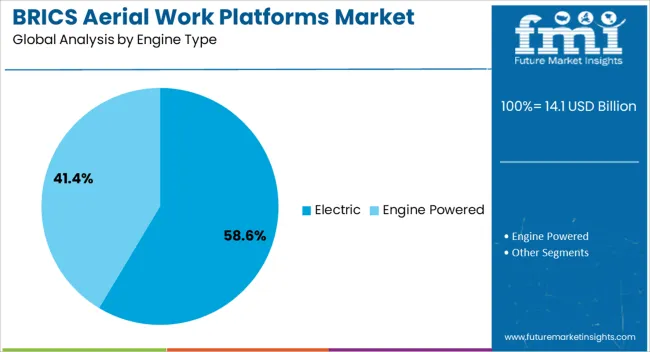
The electric engine type segment is anticipated to represent 58.6% of the BRICS aerial work platforms market revenue share in 2025, making it the leading propulsion category. This segment’s dominance is being supported by the growing emphasis on sustainability, emission reduction, and cost-efficient operation in both industrial and commercial sectors. Electric-powered aerial work platforms are increasingly preferred due to their lower noise levels, zero emissions, and reduced maintenance requirements compared to internal combustion models.
Their suitability for indoor applications such as warehouses, manufacturing facilities, and commercial complexes is reinforcing demand. Government initiatives across BRICS nations promoting green technologies and stricter environmental regulations are further encouraging the transition toward electric models. Advancements in battery technologies, including extended operating hours and fast-charging capabilities, are also enhancing operational efficiency and minimizing downtime.
Rental companies are expanding their electric fleets to align with customer demand, ensuring greater availability in the market With sustainability becoming a critical priority, the electric engine type is expected to remain the dominant propulsion system in the BRICS aerial work platforms market.
Surging demand across telecommunication sector in Taiwan, Indonesia, Brazil, India and China is likely to drive BRICS aerial work platforms market during the forecast period. Boom lifts are expected to gain significant traction in BRICS aerial work platforms market on account of increasing use in the intricate architectural settings with limited access. Additionally, boom lifts offer various benefits that includes compact design, standard oscillating axle, tight turning radius, mobility and more platform height. However, scissor lifts is anticipated to witness surging demand in BRICS aerial work platforms market in future owing to rising demand in installation and maintenance applications and mainly its operational benefits. Smartphone proliferation coupled with need for advanced telecom infrastructure is expected to positively impact the growth of BRICS aerial work platforms market.
Haulotte Company in BRICS aerial work platforms market was recently helped IGA (Istanbul Grand Airport) in onsite building world’s largest airport mega-project in Turkey. For the same, the leading company is planning to utilize over 300 Haulotte aerial work platforms, which further drives the growth of BRICS aerial work platforms market. Key players in BRICS aerial work platforms market are further planning to focus on developing boom-supported and low-weight elevating aerial work platforms for catering to the end-user demands effectively. These manufacturers in BRICS aerial work platforms market are also planning to work on automating the manufacturing processes in a bid to enhance product reliability and quality.
Mobile work platforms that can be used by workers and technicians etc to physically or manually reach inaccessible areas are known as aerial work platforms (AWPs). These platforms are supported by lifting mechanisms; usually cranes or vehicle-mounted equipment. AWPs are widely used in construction and mining industries, owing to the nature of work, complexity in structural design and elevation. AWPs are also utilized for maintenance and repair activities of high tension power lines, disaster management operations and in defence sectors. Incorporation of safety features, ease of handling, and manoeuvrability are some of the features driving the growth in the AWPmarket.
Large-scale construction projects, increasing installation and maintenance activities of street lights, power cables and transformers, up-gradation of fire-fighting stations and relatedinfrastructure, and increasing organization of festivals, concerts and corporate events are driving the need for AWPs across geographies. These platforms can be controlled using various methods such as vertical, lateral, rotational, and ground movement. Movement of these platforms is initiated with the help of compressors or hydraulics. The AWP industry can be divided into rental and privately owned segments. Rental companies account for the largest share of the global AWP market and it predominates theprivately owned sector. The main reasonrental sector dominates the privately owned sectoris due to the safety factor, as rental firms not only provide trained personnel to handle the machinery. AWPs are broadly categorized as boom lifts, scissor lifts and mechanical lifts. Boom lifts are further classified into straight and articulated boom lifts.
Some of the underlying drivers of the market are economic growth in developing countries, growing investments in real estate and infrastructure, developing telecommunication networks, increase in urbanization, worker safety concerns and adoption of best practices for efficient and sophisticated construction methods. However, lack of machine-specific training to engineers and technologicalunawareness and safety considerations related to lift equipment are the key issues affecting growth of the AWP market.
The market for AWPs is anticipated to exhibit firm double-digit growth in BRICS countries, particularly in Brazil and China. Strong residential and commercial construction projects and increase in public infrastructure spending is anticipated to support phenomenal growth by 2025. With the increasing investments in the construction industry, India and China collectively are anticipated to hold a commanding share in the AWP market. Various government construction projects for the summer Olympics and 2025 FIFA World Cup have proved to be major drivers of growth in 2025. Furthermore, increase in capital investment and growth in the mining industry indicates strong growth prospects forthe AWP market in Brazil.
Players in the AWP market adopt various strategies to gain market share, enhance sales, promoteproducts in non-rental segments such as military and governmentand expand in the utility business and service industry. Also, finding niche areas in the market that demand specific size and application ofAWPsoffers a window of opportunity to increase market share.
Some players in the market includeCaterpillar, MEC Aerial Work Platforms, Terex, JLG Lift and Access Equipment, Snorkel Lifts, Tadano, Haulotte and others.
Safety measures for AWPs is a major issue for which construction developers need to follow standards and norms as specified by concern specified by the Occupational Safety and Health Administration (OSHA). AWPs are crucial equipment for construction and building maintenance. Increased scale with regard to construction projects and decline in availability of labour force is anticipated to favour growth in the construction equipment industry and hence, the AWPmarketin the near future.This research report presents a comprehensive assessment of the market and contains thoughtful insights, facts, historical data, and statistically-supported and industry-validated market data.It also contains projections usinga suitable set of assumptions and methodologies. The research report provides analysis and information according to categories such as market segments, geographies, types, technology and applications.
The report is a compilation of first-hand information, qualitative and quantitative assessment by industry analysts, inputs from industry experts and industry participants across the value chain. The report provides in-depth analysis of parent market trends, macro-economic indicators and governing factors, along with market attractiveness within the segments. The report also maps the qualitative impact of various market factors on market segments and geographies.
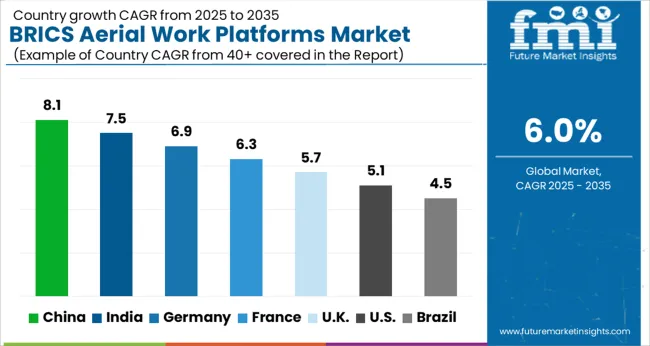
| Country | CAGR |
|---|---|
| China | 8.1% |
| India | 7.5% |
| Germany | 6.9% |
| France | 6.3% |
| UK | 5.7% |
| USA | 5.1% |
| Brazil | 4.5% |
The BRICS Aerial Work Platforms Market is expected to register a CAGR of 6.0% during the forecast period, exhibiting varied country level momentum. China leads with the highest CAGR of 50.2%, followed by India at 46.5%. Developed markets such as Germany, France, and the UK continue to expand steadily, while the USA is likely to grow at consistent rates. Brazil posts the lowest CAGR at 4.5%, yet still underscores a broadly positive trajectory for the global BRICS Aerial Work Platforms Market. In 2024, Germany held a dominant revenue in the Western Europe market and is expected to grow with a CAGR of 6.9%. The USA BRICS Aerial Work Platforms Market is estimated to be valued at USD 5.4 billion in 2025 and is anticipated to reach a valuation of USD 8.8 billion by 2035. Sales are projected to rise at a CAGR of 5.1% over the forecast period between 2025 and 2035. While Japan and South Korea markets are estimated to be valued at USD 774.0 million and USD 470.9 million respectively in 2025.
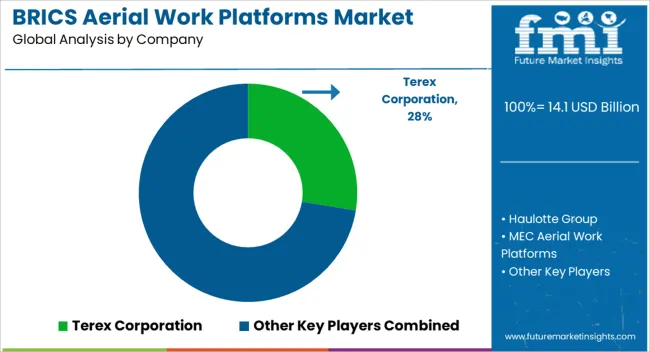
| Item | Value |
|---|---|
| Quantitative Units | USD 14.1 Billion |
| Product Type | Boom Lifts, Scissor Lifts, Vertical Mast Lifts, Portable Personal Lifts, and Others |
| Platform Height | 10 to 20 Metres, Below 10 Metres, 20 to 25 Metres, and Above 25 Metres |
| Engine Type | Electric and Engine Powered |
| End Use | Construction, Mining, Transportation and Logistics, Manufacturing, and Others |
| Regions Covered | North America, Europe, Asia-Pacific, Latin America, Middle East & Africa |
| Country Covered | United States, Canada, Germany, France, United Kingdom, China, Japan, India, Brazil, South Africa |
| Key Companies Profiled | Terex Corporation, Haulotte Group, MEC Aerial Work Platforms, Tadano Ltd., and Aichi Corporation |
The global brics aerial work platforms market is estimated to be valued at USD 14.1 billion in 2025.
The market size for the brics aerial work platforms market is projected to reach USD 25.3 billion by 2035.
The brics aerial work platforms market is expected to grow at a 6.0% CAGR between 2025 and 2035.
The key product types in brics aerial work platforms market are boom lifts, scissor lifts, vertical mast lifts, portable personal lifts and others.
In terms of platform height, 10 to 20 metres segment to command 31.9% share in the brics aerial work platforms market in 2025.
Explore Similar Insights

Thank you!
You will receive an email from our Business Development Manager. Please be sure to check your SPAM/JUNK folder too.
Chat With
MaRIA